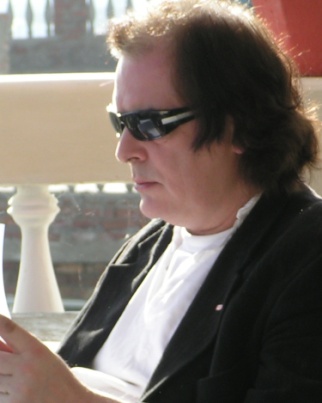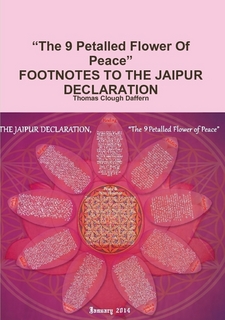We vow to abstain from corrupt political practices; we vow to tell the truth in all our political dealings.[1] We vow to work for the well being of all society, local, regional, national and international.[2] We vow to find the best practices for peace inherent in any political system democracy, aristocracy, monarchy, ecological politics, world federalism etc. and to find ways for all of them to work towards planetary political well being, global justice and peace;[3] we vow to abstain from all violence of thought word or deed to advance our political goals;[4] we vow to search out a global politics of enlightenment.[5]
How can we expect politics to help clear up the violence of the world if it is itself mired in corruption? what the planet needs now are people who go into politics and who vow to remain free from such corruption. The vow to tell the truth in political affairs is itself a key recommendation in this whole declaration. If politicians were obliged legally to tell the truth in all their official dealings, at whatever level of bureaucratic power they hold, and if they were found to have lied or misinformed people, were then automatically sacked, then we could expect an improvement in the human condition and the political landscape. Without truth-telling how can we get Satyuga back? Machiavelli did political science a great disfavour by arguing that it is politics to lie to advance ones cause. No cause worth advancing can be served by lies.
Most politicians make capital out of attacking the other party's point of view; what if there was a change, what if we recognise that most political ideologies have some good points, and some bad points. The job of the political activists is surely to home in on the good points in them all, and build coalitions of visionary and intelligent political leaders who are willing to work together to tackle our common enemies on planet earth: ignorance, poverty, violence, cruelty, war etc. Aristotle, the founder of political science in the West, argued that all forms of governance, such as democracy, aristocracy and monarchy, work best when they work in harmony with each other, in a mixed constitution, thus enabling all strata of society to cooperate towards the common goal of social well being, whose final end is peace. Kautila (or Chanaka) who was the adviser of Emperor Chandragupta Maurya, likewise argued the same in Ancient India. Philosophically, the point is not what constitution governs a country, but how virtuous are the people who are running it, as Socrates and Plato pointed out in Ancient Athens, whose very democratic assembly had sentenced Socrates to death. Likewise, a trial under the authority of Emperor Tiberius, a corrupt ruler, sentenced Jesus Christ to death, with incalculable consequences.
This is a crucial point - many politicians are quite violent and aggressive in their talk and actions; Hitler, Stalin, Mussolini, Genghis Khan, Caesar, all these who used violence to promote their ends, have perished. Buddha and Christ and Mahavira and Gandhi and other great saints argued however that a political cause will never be advanced through violence, but only through love, nonviolence and intelligence. "Those who live by the sword shall die by the sword" said Christ (Matthew 26:52). In the UK Prime Minister's question times are often quite verbally violent. In some parliaments we have seen fist fighting going on, and brawls on the floor of the house. This shows how far we have to go to get politicians to realise that the strength of their viewpoints are not served by violence, but rather by the righteousness and veracity of their positions, and these can be expressed gently but firmly. One should also be open always to self doubt and remain free for persuasion, according to right reason. Listening seems to be a dying art in politics. If we learn to listen, we stand a chance of learning and becoming wise. If we simply shout out what we think is right, without seeing the person's perspective, the situation is hopeless. The mistake of the French revolutionary leaders such as Robespierre, and then Lenin, Stalin, Hitler, Mao, Pol Pot etc and all other violent communist and Fascist leaders was that violence can bring about a new golden age. Violence only breeds more violence. If people want to live communistically, or along socialistic lines, let them do so freely, but no one should be forced into collectivisation as Stalin did to the Kulaks a the point of guns, or Mao did to the Chinese peasants, leading to mass slaughter and famine as tried and tested social and economic practices were swept away in state centralisation and one party totalitarian dictatorships enforced by violence and secret police
This is an important statement religious systems all talk, in one shape or another, of reaching enlightenment as the goal of life. Some of them seem to imply enlightenment can only come after death, in a heaven world. Others make enlightenment a very very long process, reached only after innumerable lifetimes of hard struggle and effort. In Eastern philosophy, enlightenment tends to mean an inwards epistemological awakening, a kind of nirvana or satori experience. In Jainism, enlightenment is rare, but still attainable: "The acquisition of a holistic or right point of view is the first step towards the accomplishment of enlightenment. He who finds wholeness of vision, progresses through sadhana till he achieves enlightenment" see Acharya Mahapragya Abstract Thinking (Ladnun, 1999) p.101. In Western thought, it means the gradual amelioration of society and the improvement of the living conditions of the masses. If we combine both meanings of the term, Eastern and Western, we can begin to develop a political discourse that puts the happiness, well being and enlightenment of everybody as the key purpose of our being here in incarnation and nonviolence has to be seen as an integral part of this discourse. See Daffern, Thomas Clough Enlightenments: Towards a comparative epistemology of Enlightenment in the World's Spiritual and Philosophical traditions (IIPSGP Publications, USA, 2007) See also the discussion of enlightenment in Hegel's Phenomenology of Spirit in which he effectively analyses "enlightenment" to the healing of the alienation of pure spirit and absolute knowing from being-in-the-world, in which absolute self-consciousness has to coordinate and navigate among the complexities of "being- in-a-body". Hegel's philosophy was very influential in British and indeed in Indian philosophy as well as globally in the 19th and 20th century, see Mander, W.J. et al The Dictionary of 19th century British philosophers (Thommes Press, 2002). In fact, Hegel was essentially updating Shankara's monistic idealism, with a few important tweaks, and a whole different cultural and intellectual milieu. Perhaps Hegel was Shankara's reincarnation, for all we know! See Sankara, The Roots of Vedanta: Selections from Sankara's Writings, edited by Sudhakshina Rangaswami (Penguin, India, 2012, In Plato's republic, there is also much said of the dilemma of enlightenment, and what one does, having experienced the Light of the One; Plato says that after enlightenment, one does not vanish into the ether, or retire to a cave, but rather comes back to the market place to teach, heal, and aid ones fellows. See also McLaughlin, Corinne and Davidson, Gordon Spiritual Politics: Changing the World from Inside Out (Ballantine Books, New York, 1994); see also the works of Marianne Williamson, including Illuminatta: a return to prayer (1995) and A Return to Love: Reflections on the Principles of "A Course in Miracles, for Marianne has decided to run for the USA Congress in 2014. Other authors working on aspect of enlightenment in practice include: Eckhart Tolle, Caroline Myss, Scilla Elworthy (see her works in the bibliography), Gary Zukav, Depak Chopra, Ken Wilber, see also Vasconcellos, John A liberating vision: politics for growing humans (1979) who represented Silicon Valley in the California State legislature for 30 years, and then retired to found the Vasconcellos Project and the Politics of trust network. He has argued that encouraging self-esteem is the clue to a politics of enlightenment, since so many social problem arise due to poor self-esteem issues (see The Social Importance of Self-Esteem by Andrew Mecca, Neil J. Smelser and John Vasconcellos, 1989). Warren Wagar's Building the City of Man: outlines of a world civilisation (San Francisco, Freeman, 1971) also presents a global perspective on the politics of creating a peaceful international order, as does Allot, Philip Eunomia: new order for a new world (Oxford University Press, 1990) both of these authors wonder what a global politics of enlightenment would look like. See also Booth, Ken ed. How Might We Live? Global Ethics in the New Century (2010).
 Dr. Thomas Daffern
Dr. Thomas Daffern
